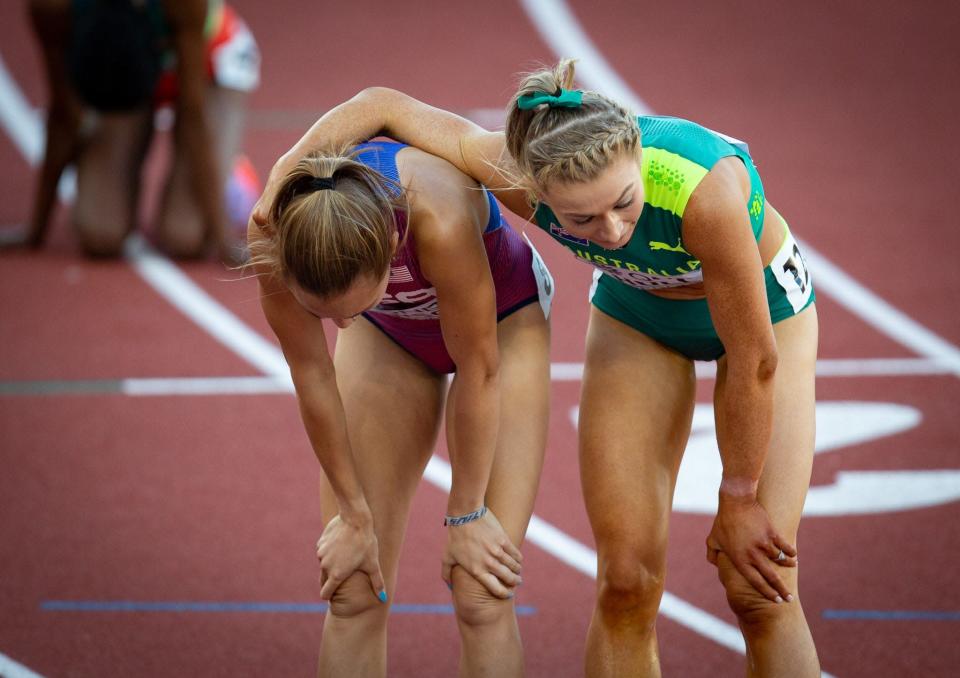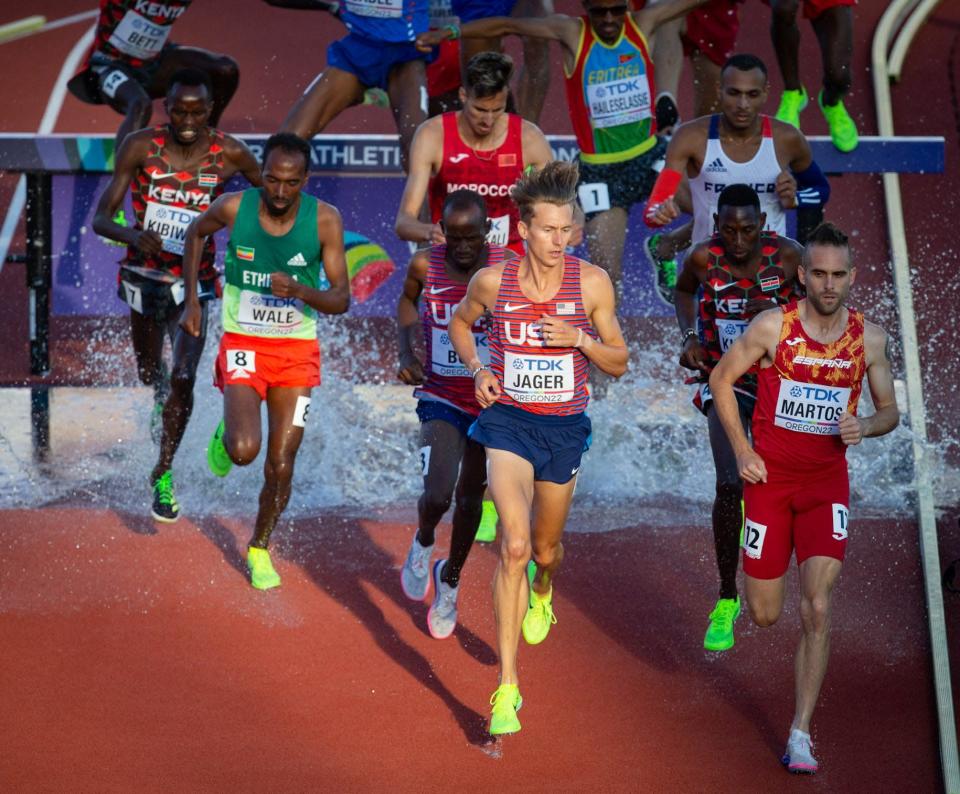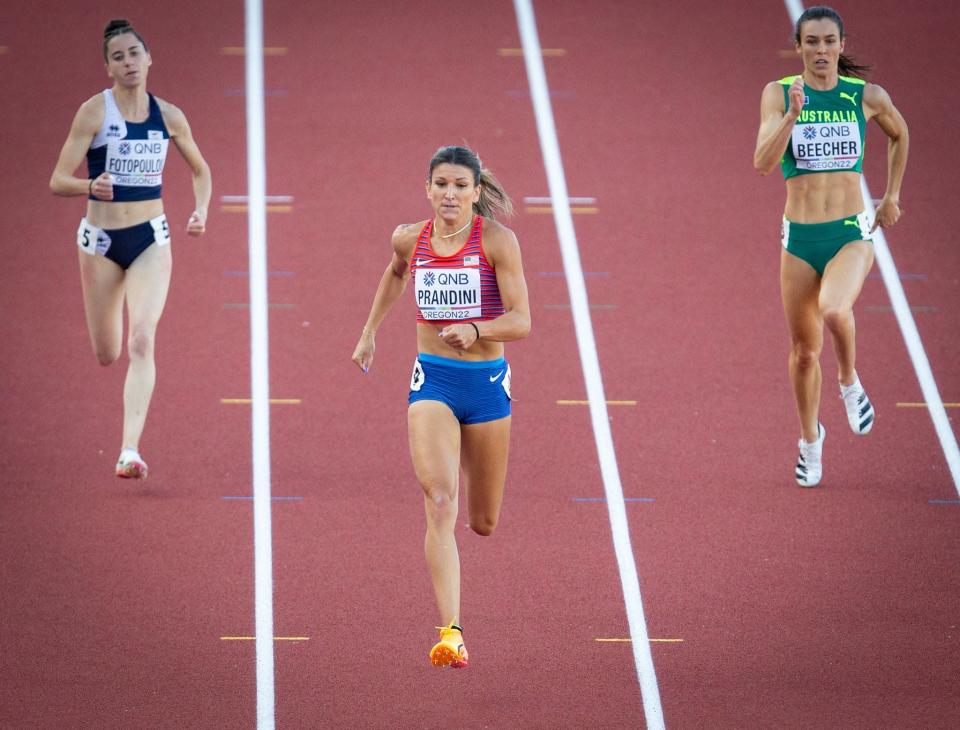Any chance of a medal — however remote — for Jessica Hull or Sinclaire Johnson in the women’s 1,500-meters ended almost immediately after the gun went off.
That’s when the three eventual medalists took off and didn’t look back, creating a big gap that the rest of the pack never came close to catching Monday during the World Athletics Championships at Hayward Field.
“It was pretty wild,” Hull lamented. “I was just mind blown at how far the gap was. They’re raising the game.”
The gold went to Kenya’s Faith Kipyegon, whose winning time of 3:52.96 was the second-fastest ever in a world championship’s final.


Gudaf Tsegay of Ethiopia was second in 3:54.52 and Great Britain’s Laura Muir won bronze in 3:55.28.
Their performances were so dominant that Ethiopia’s Freweyni Hailu’s fourth-place finish in 4:01.28 represented the largest gap between third and fourth place in world championships final.
Back in the pack was Australia’s Hull, the former NCAA champion for Oregon, and Sinclaire Johnson, the U.S. champion.
The two training partners under coach Pete Julian and the Portland-based Union Athletics Club, finished together, with Johnson sixth in 4:01.63 and Hull seventh in 4:01.82.
Kipyegon and Tsegay set a blistering pace, with Muir doing her best to stay with the leaders.
Tseguy ran the first 400 in 58.82 seconds and Kipyegon in 58.89.
“Our race plan was whatever they do, be ready,” Hull said. “But I don’t know that we ever considered that they’d go out in (58).”
“That’s just unbelievable,” Hull said. “I think it’s turning into the 800. My fastest 400 is not (58). I’ll have to talk to Pete and see how we can keep tackling these women. I want to be able to contend for medals and if that means I need to be able to go out in sub-60 and not die then we need to practice that.”
Johnson agreed, saying she needs to go back to the drawing board.
“I want to be up there, but it’s a little bit scary to latch onto that quick pace knowing how fast they’re going,” Johnson said. “It’s kind of a weird thing because I thought I was going all out, but clearly, they’re going faster.
“As much as all of us want to be up there, they’re in a class all their own right now and I have to give it to them, they put on a hell of a performance. To come back for a third race and run what they did is incredible.”
It was the first global championship meet for Johnson, 24, the former Oklahoma State standout.
It was the third for Hull, 25, who didn’t make it out of the semifinals at the 2019 world championship meet and then was 11th at the Tokyo Olympics last summer.
“Seventh place here at Hayward is a big step up from Tokyo where I was off the back with 600 to go,” Hull said. “It just shows progress, which is the coolest thing in this sport. It might not look like a medal but it’s instant gratification to see myself improve from Tokyo.”
Disappointment is Jager’s initial reaction for sixth-place finish
Even after four injury-plagued years, Evan Jager’s return to a championship finale wasn’t some feel-good story of the returning aging superstar.
Jager’s expectations were as high as ever, which also made the final result sting a little more.
Jager finished sixth in the men’s 3,000-meter steeplechase in 8:29.08 and was more than a second out of medal contention.
“Not how I thought or envisioned it ending here today,” said Jager, the best American ever in his event. “It’s been a long journey and after I have a few hours to kind of let the emotions where off, I’ll be very proud of myself. But pretty disappointed right now.”


Morocco’s Soufiane El-Bakkali was the winner in 8:25.01 as he earned a medal at his third straight world championship meet. Ethiopia’s Lamecha Girma ran 8:26.01 for his second-straight silver medal finish, and Kenya’s Conseslus Kipruto — the 2017 and 2019 champion — took bronze in 8:27.92.
Jager, who lives in Portland and is a member of the Bowerman Track Club, is the U.S. record-holder and in Rio in 2016, he won silver to become the first American to win an Olympic steeplechase medal in 32 years. He also took bronze at the 2017 world championship.
Then came a stress fracture in 2018 and 2019, COVID-19 pandemic in 2020 and a calf injury in 2021.
But Jager, 33, had been thrilled with his progression this season.
“Things have clicked so well for me these last 4 to 6 weeks that I just kept believing more and more and more,” he said. “After the prelim (on Friday) I felt my fitness was up there with just about anyone except for El Bakkali and Girma if it was a hard race from the get-go, and honestly, I was right there.”
Ducks:Oregon — the school and the state — will be well-represented at the World Athletics Championships
Prandini eases into the 200 semifinals
Jenna Prandini’s been in Eugene since the world championships began last week. Monday she finally got to get on the track.
The former Oregon sprinter cruised through her 200 preliminary round, as her time of 22.38 was good enough for a second-place finish in her heat and a spot in Tuesday’s 6:05 p.m. semifinals.
It’s familiar ground for Prandini, who has twice been an Olympic semifinalist in the 200.


“My training has been going really well,” she said. “As long as I execute I’m going to be excited with the results.”
She certainly looked strong Monday as she came off the turn with the lead and was able to coast through the finish line, even as she was passed by Nigeria’s Favour Ofili, the 19-year-old standout from LSU who won the heat in 22.24.
“I felt really relaxed and confident,” Prandini said. “I felt her come up on me, but no use fighting right now.”
Other Monday events:Gotytom Gebreslase of Ethiopia wins women’s marathon
Follow Chris Hansen on Twitter @chansen_RG or email at chansen@registerguard.com.
For more sports coverage, visit registerguard.com. Want more stories like this? Subscribe to get unlimited access and support local journalism.
This article originally appeared on Register-Guard: Track & field world championships Oregon22 Monday highlights
